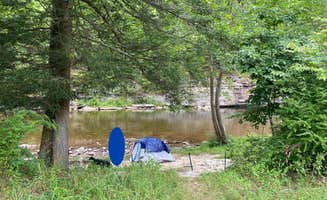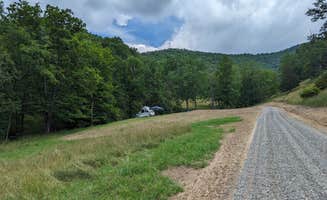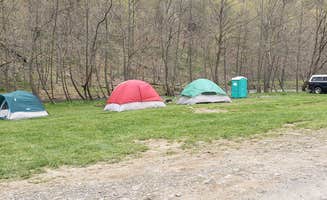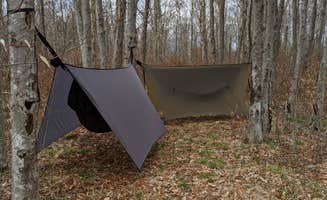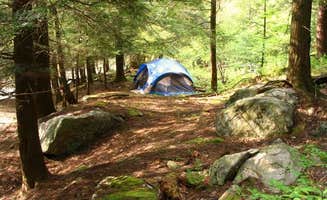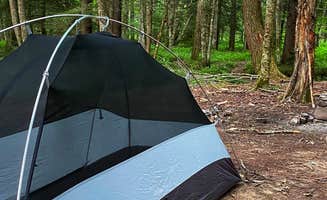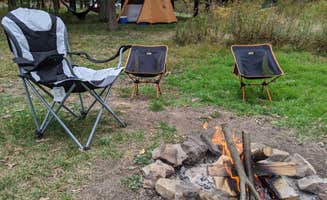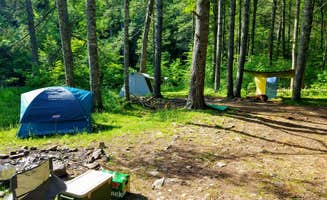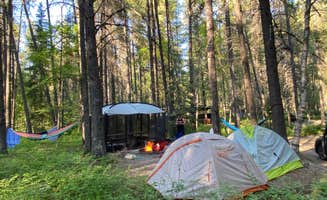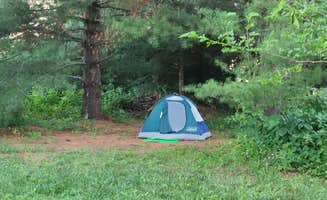Tent sites near Red Creek, West Virginia offer primitive camping experiences within the Monongahela National Forest where elevations range from 2,000 to 4,000 feet. The region contains dense hardwood forests with unique rock formations and clear mountain streams. Weather conditions vary dramatically by season, with spring bringing frequent rainfall that creates muddy access roads and campsites.
What to do
Trout fishing in local streams: Smoke Hole Canyon provides excellent fishing opportunities along the South Branch of the Potomac River. A camper at Eagle Rock Campground noted, "The river is stocked with trout and there are some areas with catch and release instructions." The river forms a natural border to the campground with fishermen often visible in the water.
Exploring unique rock formations: The best tent camping near Red Creek, West Virginia includes access to interesting geological features. At Bear Heaven Campground, "Right beside the camp ground is a really cool area to explore unique boulders and rock structures. You can either walk through or climb these boulders," according to Adam W.
Hiking nearby peaks: Several trails lead to panoramic views of the surrounding mountains. "Just a few miles up the mountain you can go to Bickles Knob firetower and get one of the best views in the state," writes a camper about the trails near Bear Heaven Campground. This makes for a worthwhile day trip while staying at area campsites.
What campers like
Complete seclusion from crowds: Little River Dispersed Campsites offers genuine isolation in primitive settings. A camper described their experience: "About 7+ miles in from the town of Durbin on a dirt road (not sure how that would go in an RV but easy in a small vehicle). Beautiful dispersed camping near a creek in dense, lush forest." The road conditions limit traffic, enhancing the sense of solitude.
Swimming holes and riverside sites: The natural water features stand out at Little River Dispersed Campsites. "When you park and walk down to the river, if you turn right, there's a beach area about 50 yards down that offers a great spot to take a dip!" Many campsites sit directly beside creeks or rivers, providing constant natural soundscapes and recreation opportunities.
Free camping options: Unlike developed campgrounds, some areas offer no-cost camping. "Little river has about 15 campsites along Little River Road. Most are decent, but a few are absolutely gorgeous," notes Tommy S., highlighting the quality of these free sites. Dispersed areas typically require self-sufficiency but reward campers with premium natural settings without fees.
What you should know
High clearance vehicles recommended: Many access roads require appropriate vehicles. At Switzer Lake Dispersed Camping, "The road is a mix of gravel but also dirt so it can become muddy during rain. If you follow the road, there is a river crossing that will take you to additional camp spots. The road beyond the river can get more tricky for low clearance vehicles."
Bear safety precautions essential: Wildlife encounters require proper preparation. A camper at Little River reported, "Not even 2 minutes from our dispersed camp site we were charged by an extremely aggressive black bear, fortunately with plenty of noise and shouting and slowly backing away we avoided further conflict!" Another advises, "There are bears here, so lock up your food in the car."
Limited or no cell service: Communication limitations affect most camping areas. One camper noted about Switzer Lake, "Just a heads up, there is no cellphone signal for any carrier from what I could tell." At Lost Land Run, conditions are similar: "Due to location in-between the tall mountains there is absolutely No CELLPHONE SRRVICE past the first couple campsites and only very spotty at those campsites as well."
Tips for camping with families
Choose established campgrounds for amenities: Families often prefer sites with basic facilities. At Bear Heaven Campground, "Spacious sites with fire pits. Vault toilet and trash. A few minutes down the road from the Bickel Knob fire tower," reports Ann P. These basic amenities make family camping more manageable while maintaining a natural setting.
Consider cabin options for mixed-weather trips: When tent camping might be challenging, cabins provide alternatives. At Abrams Creek Campground and Retreat Center, "Cabin had electric service, a microwave, electric heater, refrigerator and lights." This flexibility helps families adjust to changing weather conditions without abandoning their trip.
Look for campgrounds with simple exploration options: Young children benefit from easy natural features to investigate. One camper mentioned that Bear Heaven "inspired my love of camping and being outdoors" after exploring the area: "We had fun exploring around the campground climbing the boulders, and there were tons of trails nearby, plus overlooks with beautiful views."
Tips from RVers
Scope smaller RV-accessible areas: While many sites cater to tents, some accommodate small RVs or campers. Eagle Rock Campground offers basic RV options, as one camper described: "It is what it is, a West Virginia backwoods campground. $10 will get ya a nights stay. Like previously said drop your money in a slot and enjoy the river." The affordability makes it attractive for self-contained rigs that don't need hookups.
Prepare for primitive conditions: RV campers should expect minimal amenities. Most tent camping near Red Creek requires self-sufficiency with no electrical hookups, water connections, or dump stations. Sites typically feature ungraded natural surfaces that can challenge larger vehicles, especially during wet conditions when forest roads become muddy and rutted.


